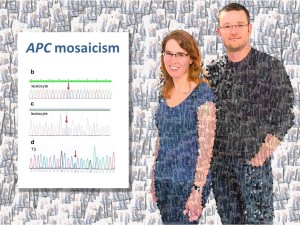Familial Adenomatous Polyposis (FAP), caused by germline mutations in the tumor suppressor gene APC, is one of the most common types of hereditary colorectal cancer. However, in a considerable fraction of families the disease remains unexplained.
This is the first study which comprehensively explored the impact of low-level APC mutational mosaicism. Multiple colorectal polyps in addition to leukocyte DNA were systematically analysed in a sufficient number (n=20) of patients with unexplained sporadic polyposis using high-throughput sequencing techniques. In 25% of patients, the same pathogenic APC mutation was identified in ≥ two polyps, strongly suggesting APC mosaicism as underlying cause of the disease. In 60% of these cases, the mosaic level in leukocyte DNA was clearly below the sensitivity threshold of routine diagnostics.
Our multiple polyp approach demonstrates that low-level APC mosaic mutations contribute significantly to the etiology of adenomatous polyposis. This has important implications for both routine work-up and strategies to identify new causative genes in patient with unexplained polyposis. (By Dr. med. Isabel Spier, http://jmg.bmj.com/content/early/2015/11/26/jmedgenet-2015-103468 )
Drs. Stefan Aretz and Isabel Spier
